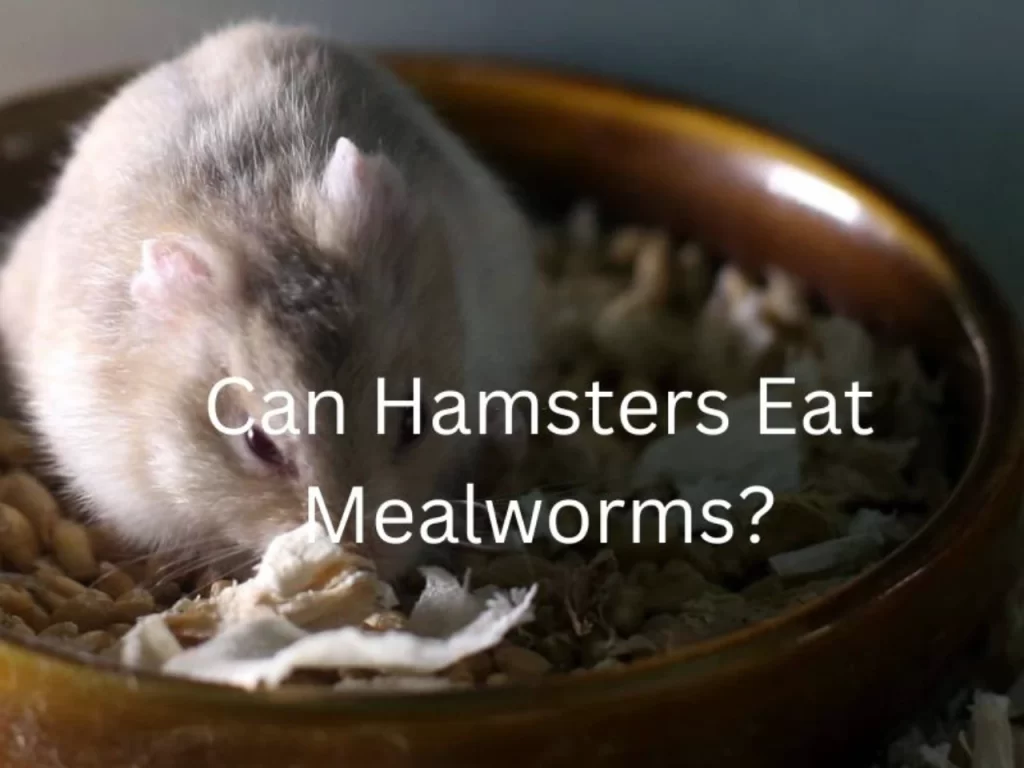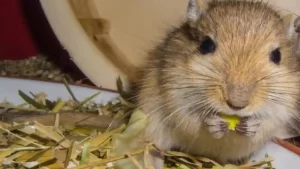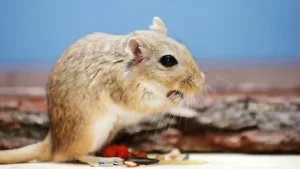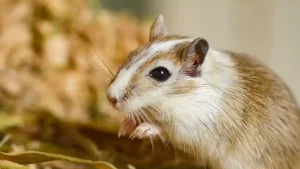The answer is yes, but not in large amounts. Mealworms are high in fat and protein, which can be beneficial for a hamster’s diet, but they should only be given to your pet in moderation. It’s best to give them no more than one or two mealworms per week as an occasional treat.
Mealworms should never replace the staple diet of fresh fruits, vegetables, grains, and hay that all hamsters need for good health.
Additionally, it’s important to remember that mealworms should always be fed life—never feed cooked or dead worms to your pet! Lastly, if you choose to supplement your hamster’s diet with mealworms make sure they are pesticide-free and sourced from a reputable supplier.
This way you can be sure your hamster is getting the best nutrition possible. With these guidelines in mind, mealworms can be a healthy addition to your hamster’s diet. Just remember to keep portion sizes small and to always feed live worms. Doing so will ensure your hamster stays healthy and happy!
Do Hamsters Eat Mealworms?
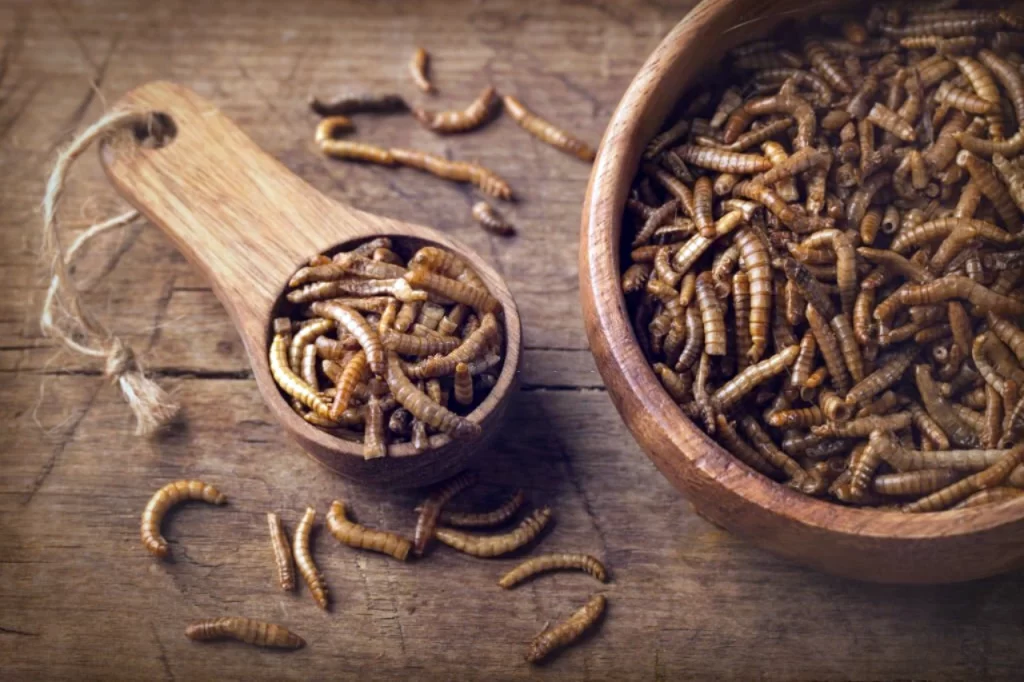
Yes, hamsters can eat mealworms. Mealworms are a great source of protein for small animals like hamsters. They provide essential amino acids and fatty acids that promote good health in these pets. Mealworms are also easy to feed as they come in a variety of shapes, sizes, and flavors.
However, you should never give your pet too many mealworms because doing so can result in stomach problems. Make sure to give your hamster only the recommended amount of mealworms each day and monitor their diet closely. This will help ensure that your pet stays healthy and happy.
Also remember to look into other sources of nutrition for your hamsters such as fresh fruits and vegetables, nuts, and seeds. These foods provide important vitamins and minerals that are essential for your pet’s health.
With a balanced diet, you can ensure that your hamster will get all the nutrition it needs to stay fit and healthy.
Overall, mealworms can be an ideal snack for your hamster as long as they are served in moderation.
Just remember to provide other sources of nutrition such as fresh fruits and vegetables, nuts, and seeds to keep your pet healthy and happy.
Is It Safe To Feed Mealworms To Hamsters?
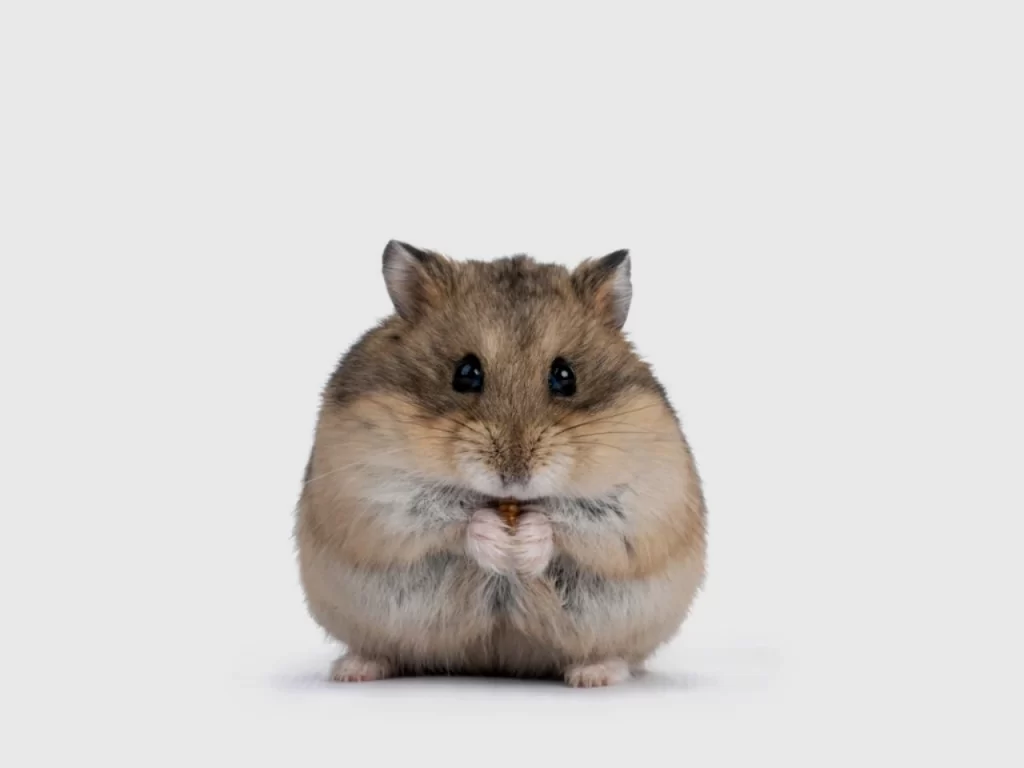
Mealworms are an excellent source of protein, vitamins, minerals, and other essential nutrients for hamsters. However, it is important to remember that they should only be offered as a treat in small amounts – no more than 10% of their total diet.
Hamsters can become sick or malnourished if they eat too much food with high levels of fat and sugar, like mealworms.
Ensure that you always buy fresh and freeze-dried mealworms from pet stores. Wild-caught worms may contain parasites or toxins that can make your hamster ill.
Mealworms should also be given in moderation to prevent obesity and health problems related to overfeeding.
It’s best to feed the mealworms on their own or as part of a healthy, balanced diet along with other fresh fruits and vegetables. Avoid feeding your hamster too many mealworms in one sitting since they can be hard to digest.
Always make sure that the mealworms are washed before feeding them to your hamster. This will help reduce the risk of germs spreading.
Additionally, check the size of the worms to make sure they’re not too big for your hamster to handle.
Lastly, always supervise your pet while it is eating worms, as these treats can pose a choking hazard if swallowed whole.
Also Read: Can Hamsters Eat Popcorn? A Complete Feeding Guide Of Popcorn For Hamsters!!!
Why Feed Mealmorms To Hamsters?
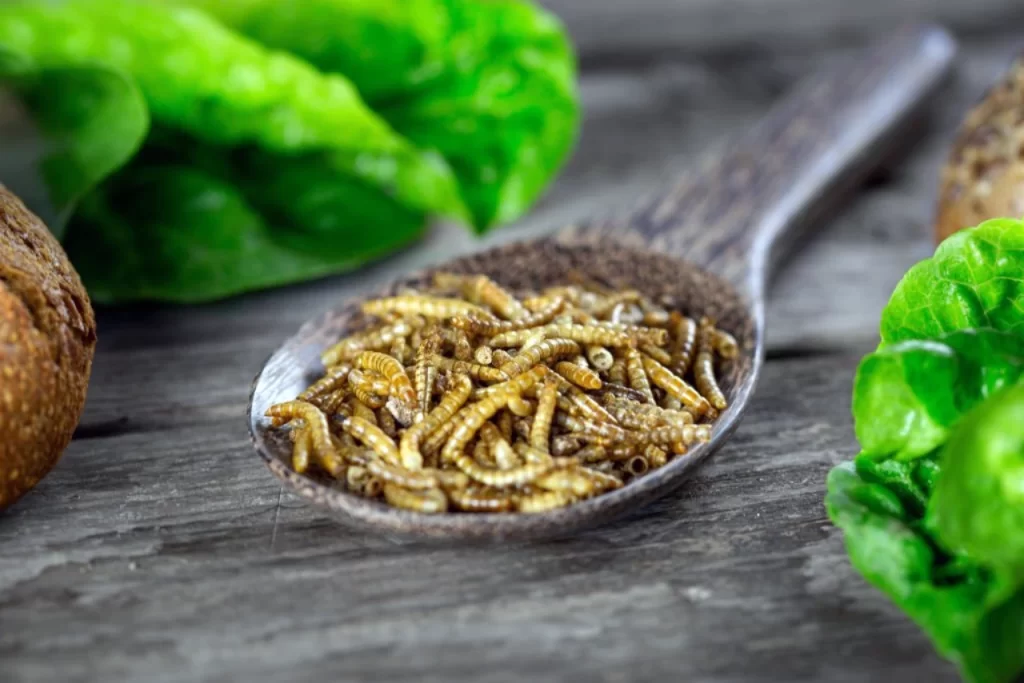
Mealworms are a great source of protein and nutrients for hamsters. They can be easily found in pet stores, or you can purchase them online.
Mealworms provide a great natural food option for hamsters, as they are high in calcium and have a soft texture that most hamsters enjoy.
They also contain essential fatty acids and minerals such as phosphorus, magnesium, and Vitamin B12. The crunchy exterior helps with dental care for your hamster’s teeth by providing extra wear down to the enamel and gums.
Mealworms can be used as treats or given as meal replacements. Hamsters love their mealworm treats! It’s an easy way to know your pet is getting the nutrition he needs while enjoying a tasty snack. Plus, it’s a great way to bond with your furry friend.
Just make sure to provide mealworms in moderation and the appropriate size for your hamster.
Mealworms For Hamsters
Hamsters need a balanced diet to stay healthy and happy, and while hamster food pellets are an important part of this, it’s also important to offer your furry friend some variety in their diet.
One excellent choice you can include is mealworms. Mealworms are a great protein source for hamsters, full of beneficial nutrients that help keep them healthy and strong. They’re easy to find, affordable, and can be offered either live or dried as treats.
When feeding mealworms to your hamster, it’s important to remember that they should always be given in moderation.
A few every week should be plenty for most adult hamsters; if you have a baby hamster who is still growing, you can offer them a few mealworms every other day.
Make sure you are offering live or dried, not canned mealworms; the canned variety may contain preservatives that are bad for your hamster’s health.
It’s also important to make sure that any mealworms you feed your pet have been raised without the use of pesticides or chemicals.
While feeding live mealworms are fine, most hamsters prefer dried ones since they don’t move around as much! Dried mealworms keep well in an airtight container and won’t spoil quickly as live ones can.
To make them even more appealing to your hamster, try sprinkling them with vitamin-fortified powdered food or yogurt powder. You can also buy pet stores’ pre-packaged mealworm snacks for hamsters.
No matter how you choose to offer them, mealworms make a great treat for your hamster and help balance out their diet with important nutrients.
Just remember to feed them in moderation, and always check the source of the worms before giving them to your pet. With a little bit of care, mealworms can be a delicious and nutritious addition to your hamster’s diet!
Also Read: Can Hamsters Eat Cheese?
Are Mealworms Bad for Hamsters?
The answer to this question depends on the type of mealworms you are feeding your hamster. Some types of mealworms can be beneficial for hamsters, while others can be harmful.
In general, it’s best to stick with small “baby” or dried mealworms, which are less likely to pose a health risk.
Unprepared and improperly stored mealworms may include bacteria or parasites, both of which can harm hamsters.
Additionally, some types of live mealworms (such as superworms) may be too large for Hamsters to chew and swallow safely, potentially leading to choking. If you do choose live worms to feed your hamster, make sure they are small enough for the Hamster to eat.
It’s important to keep in mind that mealworms should only be used as an occasional treat, not a staple food. Hamsters need a balanced diet of fresh vegetables, fruits, and high-quality commercial feed to stay healthy and happy. Feeding too many mealworms may cause digestive problems such as diarrhea or obesity.
Are Feeding Mealworms Good For Hamsters?
Mealworms will be a great source of protein and other essential nutrients for hamsters. Feeding mealworms to your pet hamster is an excellent way to provide them with extra nutrition and variety in their diet.
However, it’s important to remember that mealworms should not be the primary source of food for a hamster. They should only be fed as occasional treats or snacks, as too many may lead to obesity and other health problems.
Additionally, you must make sure the mealworms are free of parasites or bacteria before feeding them to your pet. It’s best to purchase feeder mealworms from a reputable pet store rather than wild-caught ones from outdoors.
Lastly, always monitor your hamster while they are eating to make sure they don’t choke on the mealworms. By following these precautions, feeding mealworms can be a safe and nutritious part of your hamster’s diet.
How Many Mealworms Can Hamsters Eat?
Up to ten mealworms can be consumed weekly by hamsters. However, you should never give your hamster too much food as this could compromise their health.
It is best to keep an eye on how many worms your pet is consuming and reduce their intake if necessary. Hamsters can get a lot of protein from mealworms, but they shouldn’t consume more than 10% of what they eat.
They should be supplemented with other fresh fruits, vegetables, and grains to ensure that your pet gets all the vitamins and minerals necessary for proper nutrition.
When feeding mealworms to your hamster, it is important to keep an eye on them and remove any uneaten worms from the cage as soon as possible so they don’t spoil or attract unwanted pests. Mealworms should also be stored in a dry, cool place to ensure their freshness.
Feeding too many worms could lead to potential health issues so it is important to monitor your pet’s intake and supplement with other nutritious foods.
Can Syrian Hamsters Eat Mealworms?
Yes! Syrian hamsters can safely eat mealworms. Mealworms are a healthy treat for hamsters because they are an excellent source of calcium and protein.
However, like all treats, they should be limited to no more than 10% of the total diet for your hamster. Make sure to offer mealworms that have been dried and roasted, as these are much safer for your pet to consume than their live counterparts.
Additionally, you may want to cut large mealworms into smaller pieces before feeding them to your pet as a precaution against choking hazards. Keeping in mind these safety measures will help ensure your pet enjoys his snack while staying healthy and safe.
Can Hamsters Eat Dried Mealworms?
Yes, hamsters can eat dried mealworms. Mealworms are an excellent source of protein and other essential nutrients for hamsters. They provide a crunchy texture that many hamsters enjoy and can be used as treats or part of the regular diet.
Dried mealworms are especially convenient because they stay fresh longer than live mealworms, making them a great option to store and feed your hamster over time.
When feeding your hamster dried mealworms, it is important to give only small amounts at each feeding since too much could cause digestive upset.
It is also important to make sure you check the ingredients list for preservatives or artificial colors as some brands may contain these additives which can be unhealthy for your pet.
Lastly, it is best to supplement dried mealworms with other healthy options such as fresh vegetables, fruits, and hamster pellets. This will help your hamster get a variety of nutrients from their diet and keep them happy and healthy.
Can Dwarf Hamsters Eat Mealworms?
Yes, dwarf hamsters can eat mealworms. Mealworms are an excellent source of protein and other essential nutrients for dwarf hamsters.
They provide a crunchy texture that many dwarf hamsters enjoy and can be used as treats or part of the regular diet. Dried mealworms are especially convenient because they stay fresh longer than live mealworms, making them a great option to store and feed your dwarf hamster over time.
When feeding your dwarf hamster dried mealworms, it is important to give only small amounts at each feeding since too much could cause digestive upset.
It is also important to make sure you check the ingredients list for preservatives or artificial colors as some brands may contain these additives which can be unhealthy for your pet.
Lastly, it is best to supplement dried mealworms with other healthy options such as fresh vegetables, fruits, and hamster pellets. This will help your dwarf hamster get a variety of nutrients from their diet and keep them happy and healthy.
Are Dried Mealworms Good For Hamsters?
Yes, dried mealworms are a great source of protein for hamsters. They provide essential nutrients such as zinc and vitamin B12 that are important for a hamster’s overall health.
Dried mealworms can be offered to your hamster in small quantities as an occasional treat. However, make sure that you don’t overdo it as too many can lead to obesity or other health issues.
As they are high in fat and calories, feed them to your pet sparingly. Also, monitor your hamster’s eating habits closely to ensure that they’re not only eating the dried mealworms but also their regular diet as well.
All in all, feeding your hamster with dried mealworms is perfectly safe and beneficial for its growth and development.
Can Hamsters Eat Superworms?
Yes, hamsters can eat super worms. Superworms are a type of beetle larvae that have high nutritional value and make the perfect snack for your hamster.
However, you should always ensure that the worms are properly gut-loaded to provide additional nutrients before feeding them to your pet.
The best way to do this is by feeding them leafy greens, carrots, and other nutritious foods before offering them as treats. You should also never feed more than 2-3 per day – any more could lead to an upset stomach or even further health complications in your furry friend!
Additionally, it’s important to note that while they may be enjoyable food items for your hamster, super worms should not replace their regular diet; instead, they should be used as occasional treats or rewards.
With proper care and attention, your hamster can enjoy the benefits of super worms without any adverse effects.
What Insects Can Hamsters Eat?
Hamsters can eat a variety of different insects as part of their diet, including crickets, mealworms, waxworms, and other small live prey.
Insects provide important sources of protein and other nutrients for hamsters and should be fed in moderation. It is important to properly prepare insect-based food items before offering them to your pet.
For example, crickets should be lightly dusted with calcium powder before feeding and waxworms should be frozen for at least 24 hours to kill any parasites that might harm your pet.
Always purchase insects from a reputable vendor to ensure the quality of food you are providing for your hamster.
Additionally, remove uneaten insects from the cage after an hour or two so they do not become overpopulated and harm your pet.
In addition to food items, hamsters also enjoy chewing on a variety of natural materials such as twigs, bark, and flowers.
These items provide a source of stimulation for the animals and can help prevent boredom. Be sure to use only untreated wood or plant material that has not been sprayed with any pesticides or other potentially harmful chemicals so it is safe for your pet.
It is important to provide a balanced diet consisting of both store-bought food items and insects to ensure complete nutrition for your hamster.
Additionally, always make sure fresh water is available at all times to keep your pet hydrated and healthy. With proper care and nutrition, you can ensure that your beloved hamster will thrive and enjoy a long, happy life.
Final Thoughts
Yes, hamsters can eat mealworms as part of their diet. Mealworms provide them with a great source of protein and other essential nutrients.
However, it is important to feed your hamster mealworms in moderation due to their high fat content.
It is also recommended to avoid feeding wild-caught mealworms as they may contain parasites or bacteria that are harmful to your pet’s health.
When introducing new foods into your hamster’s diet, make sure you only add small amounts at a time and monitor their reaction closely.
As long as you ensure that your hamster has access to a balanced diet, including occasional treats like mealworms, they will thrive!

